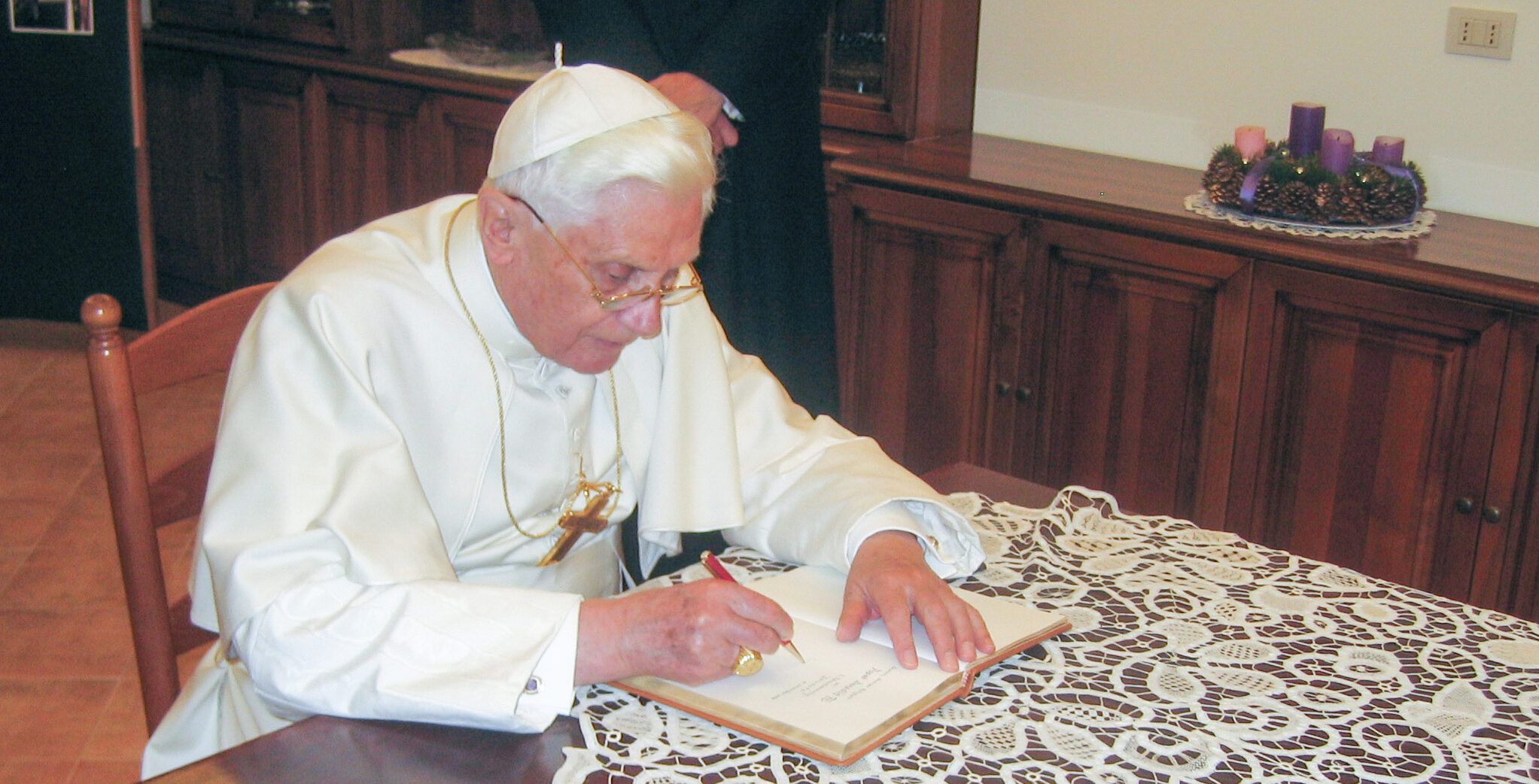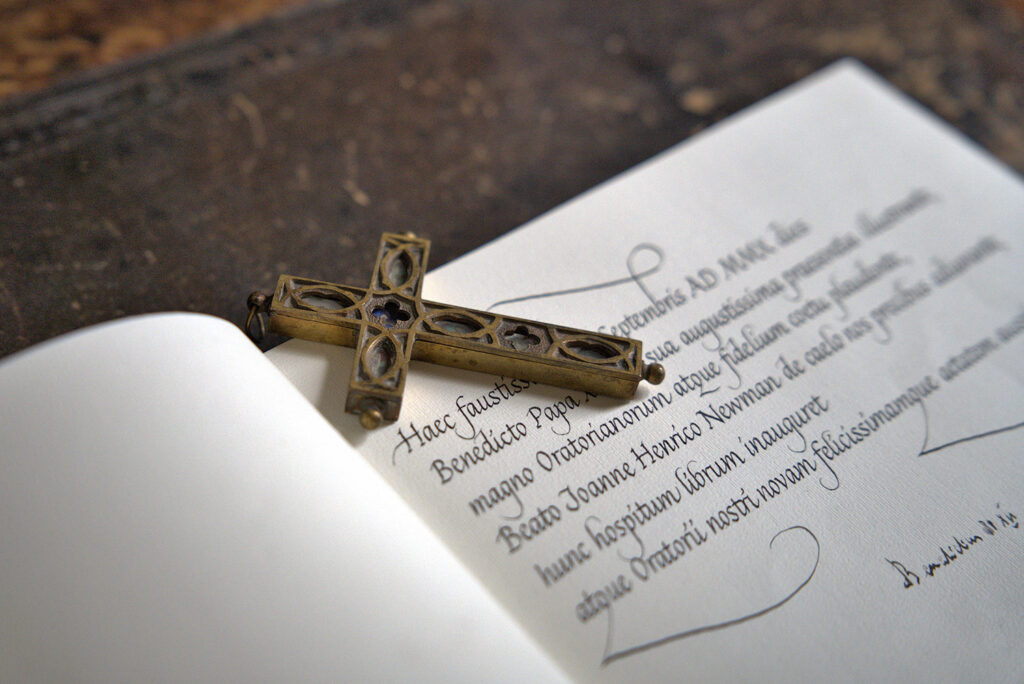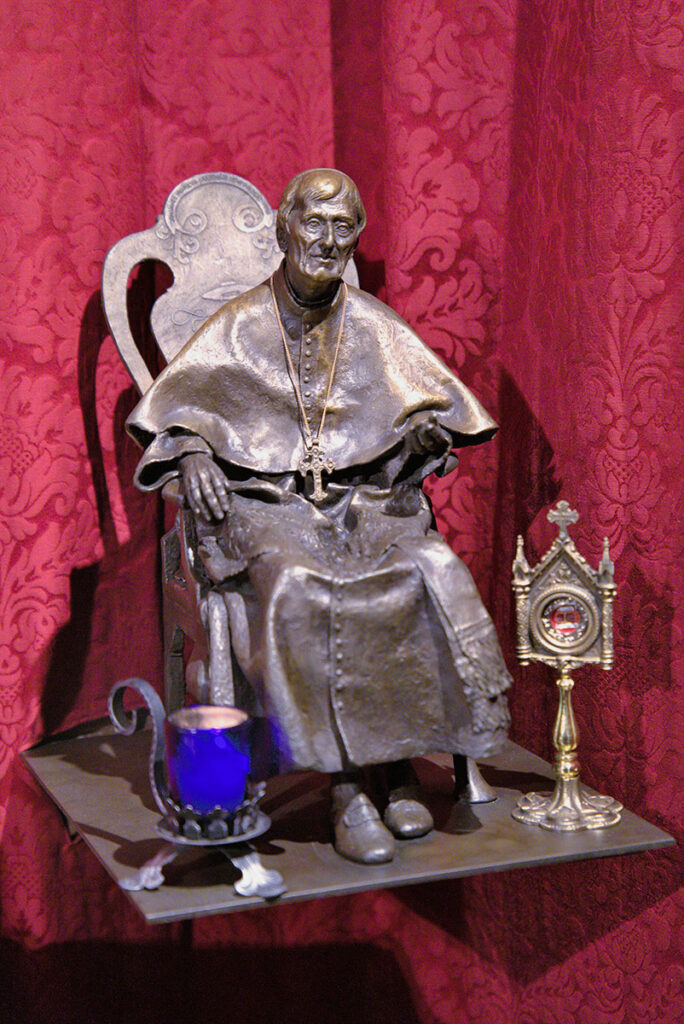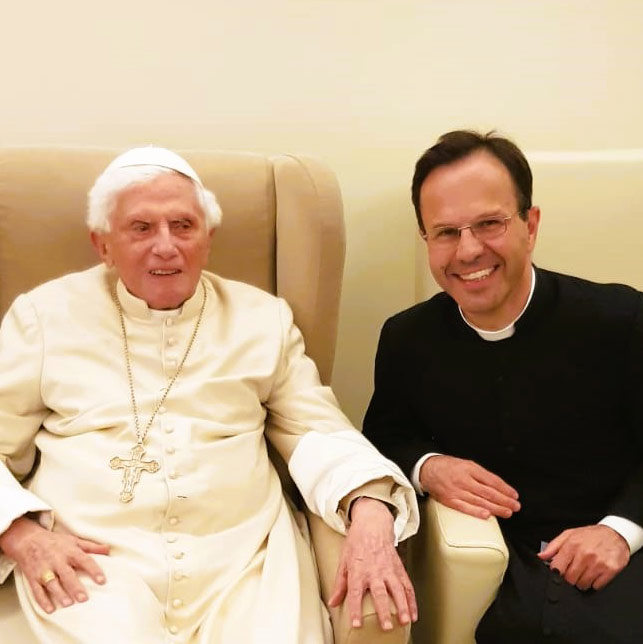
“To see Sisters who are seriously interested in John Henry Newman and at the same time have a great love of cooking, I found this combination very original!” These were the words Benedict XVI used years later to describe his first meeting with the Newman Centre on 28 September 1975. This encounter by Professor Joseph Ratzinger, who was in Rome at the time on the occasion of a meeting of the International Theological Commission, developed into a close friendship that lasted for decades. The Sisters of the Spiritual Family The Work had organized the first Newman Symposium in Rome from 3 to 8 April 1975. Shortly afterwards they were asked by Cardinal Luigi Raimondi, Prefect of the Congregation of the Causes of Saints, to continue their work of promoting the knowledge of Newman’s life, thought and spirituality for the good of the Church. Thus, the International Centre of Newman Friends was born.
When Cardinal Joseph Ratzinger came to Rome in 1982 as Prefect of the Congregation for the Doctrine of the Faith, he regularly attended events of the Newman Centre. He visited the Centre again and again. He celebrated liturgical services with Newman friends to pray for a good progress of the process of beatification. He intervened during congresses, for example in 1990 on the occasion of the centenary of Newman’s death, where he spoke about his own approach to Newman (➞ link) and ranked Newman among the great doctors of the Church.
In this way Cardinal Ratzinger also became a friend of the Spiritual Family The Work, accompanied this new Community founded by Mother Julia Verhaeghe (1910-1997) on the way to papal recognition and celebrated the Mass of thanksgiving for its approval as a Family of consecrated life by John Paul II on 10 November 2001. In the homily (➞ link) he stated: “It is not by chance, I think, that The Work considers itself a friend of Newman, with his motto ‘Cor ad cor loquitur’. Mother Julia thought from the heart and knew the Heart of Jesus – this pierced Heart, which is the source of the Covenant, the source of our life – from the heart”

It was a great joy for Benedict XVI to be able to raise Newman to the honour of the altars. Usually he delegated the celebrations of beatifications. Personally, he beatified only two great figures: John Paul II and John Henry Newman. This fact alone shows his esteem for Newman, for whose beatification he travelled to Great Britain in September 2010. At a Prayer Vigil in London’s Hyde Park (➞ link) and at the Beatification Mass in Birmingham (➞ link), he explained several aspects of Newman’s relevance for our time. At the homily he also said: “I pay tribute to all who have worked so hard over many years to promote the cause of Cardinal Newman, including the Fathers of the Birmingham Oratory and the members of the Spiritual Family The Work“.
In November 2010, the Newman Centre, in cooperation with the Pontifical Gregorian University in Rome, organized a symposium on “The Primacy of God in the Life and Writings of Blessed John Henry Newman”. In a Message to the participants of this academic event (➞ link), Benedict XVI explained the two mottos that Newman had adopted at his first conversion: “Holiness rather than peace” and “Growth the only evidence of life”. At the same time, he pointed out how Newman is “a master in teaching us that the primacy of God is the primacy of the truth and of love”.
In his address on the occasion of Christmas greetings on 20 December 2010 (➞ link), Benedict XVI summarized Newman’s importance for the present, pointing out in particular his openness to conversion, especially towards faith in the living God, and his teaching on conscience, which is not mere subjectivity of the human person but “the capacity to recognize precisely in the decision-making areas of his life – religion and morals – a truth, the truth”.

The canonization of Newman by Pope Francis on 13 October 2019 filled the Pope Emeritus with gratitude and confidence, as he was inwardly close to this holy theologian: through his openness to the questions of the time, through his deep anchoring in the Catholic faith, through his love for Sacred Scripture, the Fathers and the liturgy, through his advocacy of truth against relativism, which Newman had prophetically foreseen and fought against, through his kind, gracious and always humble manner, through his luminous fidelity to the Church and through his undaunted trust in God.
Without prejudging the judgement of the reigning Pope, Benedict XVI repeatedly expressed his hope that Newman, at the hour determined by God’s providence, would be declared a Doctor of the Church. Already in 1990, on the occasion of a Newman symposium, he had stated: “The characteristic of the great doctor of the Church, it seems to me, is that he teaches not only through his thought and speech, but also by his life, because within him thought and life are interpenetrated and defined. If this is so, then Newman belongs to the great teachers of the Church, because he both touches our hearts and enlightens our thinking”.

About the Author
Fr. Hermann Geissler FSO
Fr. Hermann Geissler, FSO, born on 12 June 1965 in Hall in Tirol (Austria), studied at the philosophical-theological high school in Heiligenkreuz/Vienna and obtained his doctorate in theology at the Pontifical Lateran University in Rome with a thesis on ‘Conscience and truth in the writings of Cardinal John Henry Newman’. A member of the spiritual family ‘L’Opera’ since 1988, he was ordained a priest in 1991. From 1993 to 2019 he worked at the Congregation for the Doctrine of the Faith; in 2009 Benedict XVI appointed him office head of the doctrinal section. Within the spiritual family ‘The Work’, Father Geissler has performed various tasks in leadership and formation. He is director of the International Centre of Newman’s Friends in Rome and teaches theology at various university institutes in Italy and Austria.
.
